6—
 :
:
Sojourn on Lemnos (Argo. 1.609–909)

After leaving their "Aulis," the Argonauts sail to the island of Lemnos and encounter the first foreign threat to the expedition, the Lemnian women. The Argonautic sojourn on Lemnos was a popular story before Apollonius, and several different versions survive, both in toto and in fragmentary form; most noteworthy are those of Pindar's Pythian 4, Æschylus's Lemniades and Hypsipyle , Euripides' Hypsipyle , and the Argonautica of Cleon of Curion.[1] None of these versions, however, has had as much influence on Apollonius's rendition of this story as Odysseus's comparable encounters with women living on islands in the Odyssey . After choosing to place the stopover on their way to Colchis (as in Euripides Hypsipyle fr. 64.93 Bond) and not on their way back (as in Pindar P. 4.252ff.), through subtle imitation of select Homeric texts Apollonius casts Hypsipyle in the roles of Calypso, Nausicaa, and Circe; and like these Odyssean heroines, the Lemnian queen's love for Jason and her desire to have him remain as her husband threatens the continuation of his mission, even before the Argo leaves the Ægean Sea. In the creation of this remarkable
[1] Apollonius's dependence on these earlier accounts has received considerable attention; cf. Blumberg 15; H. Faerber, "Zur dichterischen Kunst in Apollonios Rhodios' Argonautica (Die Gleichnisse)" (diss. Berlin 1932) 8off. (Pindar); F. Stössl, Apollonios Rhodios: Interpretationen zur Erzählungskunst und Quellenverwertung (Bern 1941) 26ff.; W. Bahrenfuss, "Die Abenteuer der Argonauten auf Lemnos bei Apollonios Rhodios (Argo. 1.601 bis 909), Valerius Flaccus (Argo. 2.72 bis 430), Papinius Statius (Theb. 4.746 bis 5.498)" (diss. Kiel 1951) 242; A. Ardizzoni, "Echi pitagorici in Apollonio Rodio e Callimaco," RFIC 63 (1965) 261ff.; and Vian 25–28.
contaminatio , Apollonius has also interwoven several other subsidiary themes (the contrast between male and female and that between the man of strength and the man of skill) and referred to other texts, which render the episode unusually complex.
In the present chapter I shall consider the first of three episodes—the sojourns on Lemnos, in Cyzicus, and in Mysia—that comprise, roughly speaking, the second half of Book 1. Since Heracles will leave the group in the final episode of the book, these are the only opportunities the reader will have for comparing Heracles and Jason in action at the same time and place. In each episode Apollonius continues his focus on the contrast between Jason's and Heracles' approach to the expedition. How they operate will ultimately decide the identity and nature of the best of the Argonauts.
Structure
The structure of this episode is the most complex seen thus far.[2] Nonetheless, it should become clear to anyone reading this section of the first book, even for the first time, that the description of Jason's cloak lies at the center of the Lemnian narrative and accordingly cuts the episode into two parts of roughly comparable length (609–720, 112 lines; 774–909, 136 lines: the central section of the episode thus extends from 721 to 773, 53 lines).[3] As we have seen in the earlier episodes of Book 1, elements in the first half are reechoed in the second. In the first half (A), after the Argonauts arrive at Lemnos, the women (who in the previous year had killed all the men of the island) decide in assembly to take advantage of their presence and use them to restore the male segment of their population. As the episode begins we are given an account of the murder of all the men on the island at the hands of the women (a, 609–39). This subsection itself assumes the ring format with balanced pictures of the male (a ) and female (a ) warriors of Lemnos bracketing mention of Hypsipyle's rescue of her father, Thoas, from the general slaughter (b ). After a brief description of the women rushing out of the city to ward off the Argonauts,
[2] I owe many of the corresponsions recorded in this summary to Hurst 58–62.
[3] Besides Hurst 58, see also Blumberg 17.
whom they believe to be Thracian invaders (b, 633–39), which description lies at the center of this first half, Apollonius gives us a picture of the Lemnian women in assembly (a , 640–720). The narrative of the assembly, like that of the Lemnian slaughter (a), also exhibits a ring-composed structure: the embassy of the Argonaut Æthalides, whose



The two tripartite subsections of the first half (Aa and Aa ) correspond in two significant ways. First, both central sections are framed by male-female oppositions (male warriors–female warriors in the first; male messenger–female messenger in the second); and second, the central panel of each section has as its focus the theme of salvation through marriage: in the first subsection Apollonius recounts the salvation of Hypsipyle's father, Thoas, who marries the Næad OEnoee[*] ; at the heart of the second subsection, Hypsipyle's nurse, Polyxo, suggests marriage with the Argonauts as the way to save their people.
The second half (A ) unfolds in the extended ring format. The arrival of Jason in the city (a) corresponds with his departure (a );[4] a conversation with Hypsipyle in which the queen gives her account of the Lemnian crime and offers Jason her kingdom (b) is balanced by a second conversation, in which she reiterates her offer and Jason repeats his refusal (b ); the procession of the Argonauts into the city of Myrine (c) is echoed by their departure from the city, on which occasion the Lemnian women rush out after them (c ). In the center is the assembly of the Argonauts (d), at which Heracles urges the Argonauts to act by leaving Lemnos and continuing with the journey to Colchis; for, he argues, the gods will not on their own present the Argonauts with the fleece (

[4] Although mention of Jason's departure appears to belong to the next section of the book in that there is no clear division between his and the Argonauts' embarkation (910b–12a) and the following journey to Samothrace, which certainly belongs to the next episode, nonetheless his sudden withdrawal from Hypsipyle clearly balances his slow and ceremonious arrival.

In the center of the episode lies the ecphrasis on Jason's cloak (B). This too reveals a carefully balanced structure. Jason's taking up of the cloak (a) and of his spear (a ) frame the description of the seven scenes on the cloak (b), which Apollonius has arranged in an extended ring. The first scene (a : the Cyclopes) and the last scene (a : Phrixus and the ram) accentuate visual and aural qualities of the artistic creations of Hephæstus and Athena, respectively. Amphion and Zethus (b ) are balanced by Apollo and Tityus (b ) in that both scenes entail the victory of skill over strength. Aphrodite with Ares' shield (g ) and the corresponding scene depicting Pelops's race with OEnomaus[*] to win the hand of Hippodamia (g ) are both concerned with the power of love. In the middle Apollonius has set an instance of the quest motif, the Mycenæans' expedition to get back cattle they believe to be rightfully theirs from the sons of Electryon (d ).
The structure of the episode as a whole, then, runs as follows:
| ||||||||||||||||||||||||||||
| ||||||||||||||||||||||||||||||||||||||||||||||||||||||||||||||||||||||||||||||||||||||||||||
A—
Arrival and Prelude to the Encounter (609–720)
The episode begins with an account of the murder of the Lemnian men (a). Apollonius fashioned this introductory material in a way that places special emphasis on the one exception to the slaughter: Hypsipyle's rescue of her father, Thoas, by setting him adrift in a chest (


All accounts of the Lemnian crime are unanimous in making Thoas the only man to escape the general slaughter of the male population of the island. But there is disagreement among the
[5] Vian's beginning of a new paragraph at 633 is confusing. In the presentation of these lines, Fränkel (OCT) and Ardizzoni more correctly, I believe, see lines 633–39 as closely connected with the introductory material; cf. Fränkel ad 1.630b–39.
[6] See Blumberg 15–16 and Vian 26–27, who argue convincingly that Aphrodite was angry with the Lemnian men, and not the women as supposed by Sad 1.609–19a, Ardizzoni ad 614, Levin 62, and, most recently, B. Pavlock, Eros, Imitation, and the Epic Tradition (Ithaca 1990) 46.
several extant versions of this story about what happened to Thoas after Hypsipyle saved him.[7] Either the Lemnian women discover and kill him (Apollodorus 3.6.4, Herodotus 4.145, hypothesis ad Pindar Nem. , p. 424 Boeckh) or he escapes from the island in a vessel of some sort (Apollonius, Val. Flac. 2.242–310, Statius Theb. 5.284–91). In the latter case, he either goes to the land of the Taurians (Val. Flac., Hyginus 120), to Sikinos (Apollonius, Xenagoras FGrHist 240 F 31; cf. Sad 1.623–26a), or to Chios (Statius). According to one version in which Thoas was discovered and killed, Hypsipyle had hidden him in a chest (



Of all the women, Hypsipyle alone spared her old father,
Thoas, who held sway over the people.
She set him adrift over the sea in a hollow chest
with the hope that he might escape.
In all likelihood, Apollonius was influenced by the story of Danaë and Perseus. Danaë's father, Acrisius, likewise set her and her infant son, Perseus, adrift in a



[7] Cf. Immisch, "Thoas (1a)," Roscher 5.803–8.
[8] Pavlock (supra n. 6) 46 sees another gender reversal in the renaming of the island Sicinus (male) from OEnoee[*] (female).

And fishermen pulled him ashore
onto an island, formerly OEnoee[*] , afterwards called Sikinos
from the Sicinus whom the naiad OEnoee[*] bore
to Thoas after the young woman went to his bed.
The question now arises: Was Hypsipyle's motive completely honorable? Fathers traditionally exposed children in chests on the sea, especially unmarried daughters discovered to be pregnant. The motive was to escape the pollution of parricide while at the same time to do away with their children.[9] Consonant with the Lemnian women's role reversal, Hypsipyle assumes here the role of a father who refuses to kill his own child but acquiesces in the inevitability of its death. In mythic accounts of such exposures it is usually sexual indiscretion and the birth of illegitimate children that occasion the abandonment to death. And it is precisely such indiscretion and illegitimacy that Hypsipyle reports as reasons for the absence of men on Lemnos when she recounts the story to Jason in the second version of the Lemnian crime (cf. 798–826). The suggestive inversion of the exposure motif at the very least brings Thoas's innocence into question. Moreover, Hypsipyle confirms her usurpation of her father's role when she dons his armor (637–38), sits on his throne (667), and offers his kingdom (827–29). As a result of the Lemnian crime, women now perform the functions of men. A daughter even appears to expose her father for his sexual encounters.
After the introductory triptych explaining the absence of the Lemnian men, Apollonius briefly depicts the panic among the Lemnian women as the Argo approaches (b). The women rush down to the shore (


In their first rush to the shore, the women are portrayed in a traditionally male role as they prepare to ward off the Argonauts; in the corresponding section, they will be seen to have reverted to their earlier female roles when Apollonius subtly suggests that they will become the mothers of the Argonauts' children.
In the third section of the first half (a ), Apollonius sets the scene for the encounter between Jason and Hypsipyle. The Argonauts send their herald, Æthalides, a son of Hermes endowed with an imperishable memory, to ask permission to stay the night. The next day, however, the opposing north winds prevent them from leaving (a , 640–52; 13 lines).[10] The women then meet in assembly. On the advice of Polyxo, they decide to invite the men into the city in the hope of reestablishing the male community. Hypsipyle thereupon instructs Iphinoë to approach the leader of the group, inviting him to speak with her in Myrine while the rest of the Argonauts have her permission to avail themselves of the island (b , 653–708). Iphinoë delivers Hypsipyle's invitation, and the Argonauts happily accept (a , 709–20; 12 lines). The embassy of Æthalides clearly corresponds with that of Iphinoë,[11] and the assembly of the Lemnian women falls in the central position between them.
In addition to the contrast between male and female in the framing elements, which parallels the format of the introductory narrative (a), Apollonius, as mentioned above, records each herald's embassy in a contrastive fashion. He does not report Æthalides' speech to Hypsipyle and the Lemnian women (

[10] PaceSad 1.652, who sees them remaining despite the blasts of the north wind; see Mooney ad 1.651–52, Vian 257 ad 652, and A. Ardizzoni, "'Trappole' e infortuni apolloniani," GIF 30 (1978) 276–78. Cf. Stössl (supra n. 1) 31ff., who sees this as one of the seams that reveals Apollonius's model, Æschylus's Hypsipyle .
hand, he has Iphinoë repeat Hypsipyle's message almost verbatim. After the assembled women decide to welcome the Argonauts into the city with the hope of luring them into their beds (cf. 695), the poet continues:
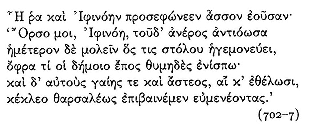
She [sc. Hypsipyle] said this and then addressed Iphinoë, who was
close at hand:
"Go quickly, Iphinoë, and ask the man
who leads this expedition to come to our home so that
I might announce to him the decision of our people, which I am
sure will
please him; and tell the others they can disembark without fear
and
come into the city, if they so desire and their intentions are
friendly."
Iphinoë's embassy provides one of the few instances in which Apollonius repeats several lines of text.[13] Iphinoë gives a close, but not perfect, rendition of Hypsipyle's message:
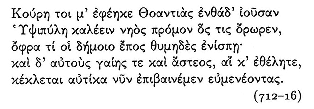
[13] See G. W. Elderkin, "Repetitions in the Argonautica of Apollonius," AJP 34 (1913) 198–201.
Hypsipyle, the daughter of Thoas, has ordered me to come here
to summon the captain of the ship, whoever he is, so that she
might announce to him the decision of our people, which she is
sure will
please him; and to tell you others to disembark right now and
come into the city, if you so desire and your intentions are friendly.
The female herald, whose name implies strength or force of mind, slightly edits her message, unlike, it would seem, her male counterpart in the first embassy. In place of



Hypsipyle opens the assembly, which these two contrasting embassies frame in the center of the subsection (b ), by inviting a discussion on the problem of what to do with the Argonauts, who are as yet unaware of the situation on Lemnos. After suggesting that they keep them away from the city by giving them supplies for their journey, she concludes by inviting other suggestions:[15]

If any other among you can come up with a better idea ,
let her stand up; for this reason I summoned you here.
The scholiast ad 1.665 noted that Hypsipyle's openness to other proposals was modeled after a similar request made by Agamemnon in the Iliad :[16]
[14] Fränkel ad 1.709–20 (cf. also p. 98 n. 188) suggests that the repetition serves Hypsipyle's ruse; she did not want Jason to know too much, but wanted to give him her own explanation for the absence of the men. E. George, "Poet and Characters in Apollonius Rhodius' Lemnian Episode," Hermes 100 (1972) 57, argues that Apollonius wanted to underscore the nervousness of the Lemnian women in their invitation by having Iphinoë slightly confuse the message.

I wish someone would now come up with a better idea than this,
either young or old. This would please me.
When Agamemnon invited anyone, young or old, to suggest a plan in the wake of their defeat at the hands of Hector, Diomedes, first excusing his youthfulness (ibid. 110–27), advised immediate action. Polyxo similarly calls for immediate action in the case of the unexpected arrival of the Argonauts (693–96). Not only does Hypsipyle's elderly nurse contrast with Diomedes in gender and age, but even in the nature of her advice; she speaks of surrendering themselves and their homes to the Argonauts, while Diomedes advocates a more aggressive approach in their war against the Trojans. The change of advice from an immediate attack in the battlefield to immediate submission in bed is as striking as it is suggestive of the importance that love will play in the present episode and in the epic in general.
The inversion of this Iliadic model parallels the adaptation of an Odyssean text that immediately follows. Once Hypsipyle sits down on her father's throne after her brief address to the assembly, the elderly Polyxo rises to speak, surrounded by four aging maidens:[17]
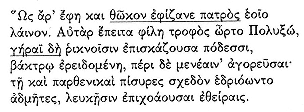

Thus she spoke, and she sat down on her father's seat
of stone. Then Polyxo, her beloved nurse, arose,
moving haltingly on legs twisted from age and
leaning on her cane; she was most eager to address the assembly.
Alongside her sat four young women,
unmarried girls whose hair was beginning to turn gray.
She stood in the middle of the assembly and could barely hold
her neck up, her back was so badly crippled . She said the
following.
The scholiast ad 1.669 was the first to observe that Apollonius had a specific Homeric passage in mind, in this case from the second book of the Odyssey :[18]
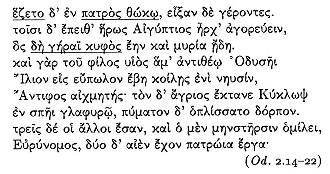
He [sc. Telemachus] sat down on his father's throne and the elders
yielded.
The hero Ægyptus was the first to speak among them,
a man who was crippled from age and knew countless things.
For his own dear son went together with godlike Odysseus
to horse-rich Ilion in the hollow ships,
the warrior Antiphus. The savage Cyclops killed him
in his cavernous home, the one whom he ate last.
Yet there were three other sons, and one associated with the
suitors,
Eurynomus, while the other two stayed on their father's farm.
In the Homeric passage, Telemachus called the first assembly held in Ithaca since the departure of Odysseus for Troy twenty years earlier. As Telemachus sits on his father's throne, the aged Ægyptus, who was the father of four sons, asks the reason for the assembly. He imagines that there must be the threat of an invading army (ibid. 25–34).[19] Here we can observe several points of contact with the Argonautic text:
• Hypsipyle, the daughter of the king, calls an assembly just as does Telemachus, the son of Ithaca's king, Odysseus.
• Both Telemachus and Hypsipyle are portrayed as seated on their fathers' thrones.
• The aged Polyxo is the female counterpart of the aged Ægyptus.
• The four maidens with Polyxo parallel the four sons of Ægyptus.
• Invading armies are the apparent concern of both assemblies.
Moreover, both assemblies take up the issue of prospective marriages: the Lemnian women debate marriage with the Argonauts, while in the Ithacan assembly, marriage with Penelope lies at the heart of the problem for which the people were convened. In both this and in the previous Iliadic reference, Apollonius contrasts the Lemnian women with Homeric males, a contrast that reflects the gender opposition of the surrounding frame (Æthalides-Iphinoë).
By counterposing Lemnian and Argonautic men with Lemnian women in the structure of the subsections, and by inverting the gender of the exposure motif and the Homeric models, Apollonius pits male against female in the first half of the episode. The gender antithesis neatly reflects the role reversal of the Lemnian women, which lies at the heart of the story. These armed warriors, highlighted at the center of the first half, will threaten the continuation of the Argonautic mission. As will become clear in the second half of the episode, the poet will imply through allusion to well-known Homeric texts that the Argonauts are in danger of becoming less than men because of their association with the masculine women of Lemnos.
[19] Cf. W. B. Stanford, The Odyssey of Homer (London 1950) vol. 1 ad 2.30.
B—
Jason's Cloak (721–73)
Apollonius frames the elaborate description of Jason's cloak, which lies at the center of the episode, with balancing descriptions of Jason taking up his cloak (a) and his spear (a ). Two elements confirm the corresponsion of these subsections, which thereby create a ring. In the first line of the first paragraph (a), Apollonius identifies the cloak as the work of Itonian Athena—




Apollonius modeled his ecphrasis on the famous description of the shield that Hephæstus made for Achilles in Iliad 18. Not only does Apollonius employ the formulaic


[20] Vian 83 n. 2, 86 n. 3.
[21] See Mooney ad 1.730–68, Ardizzoni ad 73off., Vian 84 n. 2, and Campbell ad 1.73off. As Vian points out, the Hesiodic Aspis employs this same cataloguing technique.
[22] See Mooney ad 1.731, Vian 258 ad 734.

On it there were Cyclopes engrossed in their immortal work of
forging a thunderbolt for Lord Zeus. Its brilliance had already
been achieved,


in the act of hammering out with their iron mallets.
In the Iliad , Hephæstus was working on twenty tripods, which similarly still needed their handles:
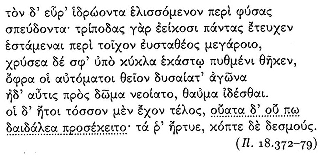
She found him [sc. Hephæstus] sweating as he moved about the
bellows
in haste. He was making tripods, twenty in all,
to stand around the wall of his well-built hall;
he set golden wheels on the base of each
so that they might enter the assembly of the gods on their own[23
] and come back to his home, a marvel to behold.
They were finished up to this point,



hammering the rivets.
There are, it is true, two instances of cloaks embroidered with various scenes in the Iliad (for

3.125–28, 22.440–41), but it seems clear from Apollonius's inclusion of a forged implement just short of completion in the passage that the poet had Achilles' shield specifically in mind in providing a lengthy, scene-by-scene description of Jason's cloak. The effect of this reference, like the frame of the ecphrasis itself, encourages us to envisage Jason as a warrior going off to battle, and in particular, as a counterpart to Achilles. For Achilles took up his fabulous shield to face Hector and to achieve his greatest victory on the field of battle. What ensues, of course, is quite different.
Apollonius continues the comparison between Achilles and Jason in the beginning of the next section (A ), to which I now turn briefly. The poet draws a comparison between Jason's approach to Hypsipyle's palace at Myrine and a star that appears to brides in their chambers or to a maiden awaiting the return of her fiancé who is out of the country. The simile neatly parallels the situation at hand: the Argonauts will soon visit the chambers of the Lemnian women, and Jason, coming from a foreign land, will encounter the virgin Hypsipyle. Three times in the Iliad , Homer compared a warrior approaching his opponent to a star, the point of comparison being both its brilliance and its harmfulness (cf. Il. 5.4–6, 11.62–64, 22.25–32).[24] The last example is especially relevant to Jason: there Achilles, dressed in his new armor, approached the city of Troy to do battle with Hector.[25] Apollonius has thus set the scene for the meeting between Jason and Hypsipyle in such a way that the reader envisages a climactic military clash between opposing warriors. But instead of such an encounter, we find the well-dressed and urbane Iolcan prince sweeping the young Lemnian queen off her feet.[26] The vivid contrast between the reader's expectations and the actual event is significant. Jason is not an Achilles, who succeeds by virtue of his martial prowess. On the contrary, making young women fall in love with him will prove to be this hero's most potent skill, one
[24] Cf. A. W. James, "Some Examples of Imitation in the Similes of Later Greek Epic," Antichthon 3 (1969) 79–80 (ad 3.956ff.); and R. W. Garson, "Homeric Echoes in Apollonius Rhodius's Argonautica ," CP 67 (1972) 8.
[25] Noted by Mooney ad 1.774, Vian 86 n. 3, and Campbell ad 1.774–75.
[26] Sad 1.721–22 has noted the appropriateness of Jason's attire as he goes to meet Hypsipyle.
that will play an important role in establishing him as the best of the Argonauts.[27]
Before turning to the "heroic" match featured in the second half of the episode, I shall first examine at greater length the individual scenes on the cloak, which Apollonius arranged in an extended ring. These scenes view both the Argonautic expedition and Jason's role in it through a series of icons that reflect salient events ahead for the Argonauts.[28]
In the first scene (730–34), the Cyclopes are about to finish one of Zeus's thunderbolts, and, as I noted, the poet here deliberately evokes the image of Hephæstus at the time of Thetis's arrival just prior to his forging of Achilles' new armor. Mention of the Cyclopes and of Zeus's weapon picks up where Orpheus's song
[27] It should not be overlooked that when Odysseus first encountered Nausicaa, a figure with whom Hypsipyle will be compared in this episode, he emerged from the bushes "like a mountain-bred lion"; in this way, says Homer, Odysseus was about to associate with well-tressed young women (Od. 6.130–36). Similes such as this normally describe a warrior about to engage in armed conflict.
(496–511) left off: there Zeus did not yet have his thunderbolt, the source of his




More easily would you cast your eyes into the rising
sun than gaze upon the cloak's ruddy brilliance.
The two, man and god, are now armed and dangerous. Zeus attains his


The second scene (735–41) features an episode in which the antithesis of strength versus skill once again emerges. In the building of Thebes, the strongman Zethus struggled to lift boulders the size of a mountain peak on his shoulders, whereas Amphion through the sound of his music caused rocks twice as large to move by themselves. The image recalls the contrast between Orpheus and Heracles in the Catalogue: the former had led trees from Pieria to Thracian Zone through the power of song (28–31), while the latter was carrying the Erymanthian boar on his shoulders at the moment that he heard of the Argonautic expedition (124–29). This scene nicely parallels the way in which Jason succeeds in this expedition. For unlike Heracles in his attainment of the golden apples of the Hesperides, Jason will ultimately secure the object of his quest not by virtue of his physical strength, but through Medea's
magic, acquired from the impressionable young girl through his physical attractiveness and verbal dexterity.
The sensual portrait of an Amazon-like Aphrodite occupies the third scene (742–46). Part of the goddess's tunic has slipped off her arm, exposing her breast as she uses Ares' shield as a mirror. The goddess of love in the likeness of an Amazon anticipates the two warrior maidens Jason will encounter in the poem: the armed Hypsipyle (637–38) in the present episode and the even more dangerous Medea, who successfully takes on Talos, the last of the Bronze Race, in the final book (4.1636–72). The image of the love goddess on Jason's cloak is highly significant because, as Phineus will later tell Jason, his mission will succeed through the help of Aphrodite (2.423–25), who will provide the hero with the means for achieving his goal by sending Eros to make Medea fall in love with him. In fact, Aphrodite's role in the Argonautica so closely parallels Medea's that the goddess in a way can be seen as an Olympian analogue of the Colchian maid. For both women give the self-centered young men of their lives golden objects: Medea, the fleece to Jason; Aphrodite, the golden ball to Eros.[29]
In the fourth and central scene (747–51), the Teleboans, also called Taphian pirates (750), have the upper hand in a battle with the sons of Electryon over cattle. The scholiast ad 1.747–51b recalls Herodorus's explanation for this battle: the Teleboans are the grandchildren of Hippothoë, herself the granddaughter of Perseus and Andromeda, who went to Mycenae to demand from Electryon their inheritance, the cattle that they insisted rightfully belonged to them.[30] The story parallels the Argonautic expedition
[29] This point is made by T. M. Klein, "Apollonius Rhodius, Vates Ludens : Eros' Golden Ball (Arg. 3.113–50)," CW 74 (1980–81) 225–27. As Collins 73 pointed out, Aphrodite's possession of Ares' shield implies a tryst with the god of war. The marital strain and threat of divorce that this affair caused, celebrated by Demodocus in Odyssey 8, could well be another implication we are meant to draw from the vignette. Such a theme would parallel the subtle comparison between Medea and Thetis made in the previous episode and the failed marriages of the Lemnian people. D. C. Feeney, The Gods in Epic (Oxford 1991) 70, aptly describes this scene as a "representation in words of a representation in cloth of a representation in marble of a goddess—and her reflection."
[30] Cf. E. Livrea, "L'épos philologique: Apollonios de Rhodes et quelques homérismes méconnus," AC 49 (1980) 150–52.
quite closely. Like the Argonauts, the Teleboans made a long journey (from the island of Taphos, near Acarnania, to Argos) in order to retrieve something that they believed was theirs; while they sought a herd of cattle, Jason travels to Colchis in search of the hide of an animal that belonged to his ancestor, Phrixus (who together with the ram appears on the last scene of the cloak). As we have seen at the center of the Catalogue, the motif of the journey made in quest of special animals becomes a symbol in Apollonius for the Argonautic expedition.
The fifth scene, like the third, has to do with the realm of love (752–58). While Pelops rides together in a chariot with Hippodamia, her father, and the charioteer, Myrtilus, follow them in fast pursuit. The story clearly anticipates Jason's future experience in Colchis. Like Pelops, he will take up the father of the bride's challenge—although not in a chariot race, but in the yoking of fire-breathing bulls with which he will plow a field and sow the dragon's teeth. Jason will then escape with Medea on the Argo , and through betrayal and deceit kill not the father of the bride, Æëtes, but as a most cruel substitute, his innocent brother-in-law, Apsyrtus.
The sixth scene (759–62) balances the second by focusing once again upon the antithesis of strength versus skill. The youthful and smaller Apollo (


In the seventh and final scene (763–67), Phrixus listens as the ram speaks. The workmanship of the marvelous cloak is so exquisite that the narrator exclaims:

Looking at these you would fall silent and deceive yourself
in the expectation of hearing some intelligible message from them;
you would spend a long time hoping to see something.
The embroidery is so spellbinding, the narrator seems to say, that the viewer feels drawn into the scene and even expects to hear some


[32] Apollonius alluded to this at 1.525–27; cf. Vian 74 n. 4.
In sum, through the progression of the scenes on Jason's cloak from imminent

Before concluding this discussion of Jason's cloak, I return to the introductory verses (a). In his overall description of the cloak, Apollonius emphasizes its ruddy brilliance:

More easily would you cast your eyes into the rising
sun than gaze upon the cloak's ruddy brilliance.
For the central area was given a reddish hue
and the border was purple.
The key words are



(



A—
The Encounter and Departure (774–909)
This final section of the Lemnian sojourn possesses an extended ring structure much like that of the description of Jason's cloak. To summarize what was said above: it begins with Jason's approach to and arrival in Myrine (a, 774–90a) and ends with his departure from the city and the island (a , 910a). A conversation between Jason and Hypsipyle follows Jason's arrival (b, 790b–841) and precedes his departure (b , 886–909), and during both conversations Hypsipyle offers her kingdom to Jason. After the first conversation the Argonauts proceed to Myrine (c, 842–60) and before the last they leave the city (c , 875–85). In the middle stands the assembly of the Argonauts (d, 861–84), which corresponds to the assembly of the Lemnian women in the first half. The central positioning of a significant section once again proves to be instructive. For the Argonautic assembly not only contains a reference to an Odyssean episode that will emerge as an important subtext in this half of the Lemnian sojourn, but also herein Heracles makes an assertion that evinces his approach to the heroic


In her first speech to Jason, Hypsipyle gives her explanation for the absence of men on the island and invites the Argonauts to visit her city; she even goes so far as to offer Jason rule of
[34] E. Phinney called to my attention that the spear also "hints at bad luck in love, as Atalanta attracted Meleager, only to set in force a chain of events that led to Meleager's death."
her kingdom. The men, with the exception of Heracles and a few others, accept the invitation to come into the city and go to the homes of the women. They stay for an unspecified time and give no indication of being about to leave until finally Heracles calls an assembly, reminding them of their need to fetch the golden fleece. Only then do the Argonauts leave the island. Hypsipyle and the women of Lemnos have thus become the first real threat to the expedition; for had Jason accepted Hypsipyle's offer, the mission would have come to a halt and failed. In this way, the Lemnian sojourn parallels Odysseus's encounters with Calypso, Nausicaa, and especially Circe, all of whom, like Hypsipyle, live on islands.
When Jason arrives within the city, the women rejoice at the sight of the first man they have seen in their midst in a year. In their eagerness to meet Jason, they almost attack him (

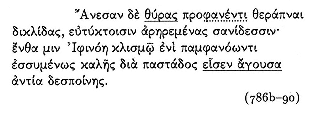
[35] Fränkel ad 1.769–73 has pointed out the irony in Jason's reception in Myrine: he had refused to take Atalante along because problems would have arisen with her, the only woman in the midst of unruly men; Jason now finds himself the only man among very aggressive women.

folding doors , fitted with elegantly made louvers.
Here Iphinoë escorted him eagerly through the beautiful
colonnade and sat him upon a radiant couch
opposite her mistress.
When Odysseus arrived at Circe's cottage, she herself opened the doors and led her guest to his seat:

Immediately she [sc. Circe] came out and opened the

and invited me in; and I followed, distressed in my heart.
She escorted me to a beautifully made couch, with inlaid silver,
and had me sit down. There was a stool for my feet.
Jason, dressed in his splendid cloak, thoroughly captivates Hypsipyle, whose face now reflects the color of his cloak. His royal host proceeds to explain the absence of the men on Lemnos and then goes on to offer Jason the throne of the island (793ff.). Apollonius describes her account of the Lemnian crime as "wily":


[38] Cf. Ardizzoni ad 790 and M. Fantuzzi, "Omero 'autore' di Apollonio Rodio: Le formule introduttive al discorso diretto," MD 13 (1986) 101.

His [sc. Atlas's] daughter keeps him a prisoner in his sorry,
wretched state,
always beguiling him with deceitful and wily words
so that he might forget Ithaca.
Hypsipyle's intention, like Calypso's, is to get Jason and the Argonauts to stay; and just as Calypso (Od. 5.160–70) misled Odysseus by suggesting that she was letting him go of her own volition (she never mentions the command she received from Hermes [ibid. 97–115]), Hypsipyle misinforms Jason by averring that the Lemnian men are still alive and living with their Thracian captives and legitimate sons. If Jason is taken in by these wily words, he runs the same risk that Odysseus did, of forfeiting his

At the end of her account, Hypsipyle offers Jason the throne of Lemnos:
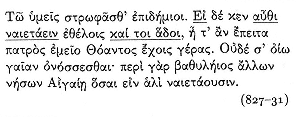
And so, move about among the people, and if you should
want to live here and this pleases you , by all means then
you may have the office of my father, Thoas. I do not think
you will fault our land, for it is fertile beyond the other
islands that lie in the Ægæan Sea.
After Odysseus's bath on Phæacia, Nausicaa marveled at his appearance, much as Hypsipyle does here upon Jason's arrival. The Phæacian princess then made a wish that Odysseus remain as
her husband, a prospect that Alcinous later invited Odysseus to consider:[40]
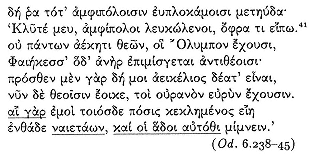
Then she spoke to her long-haired servants:
"Hear what I have to say, my fair-armed servants.
Through the will of all the gods who inhabit Olympus
this man mingles with the godlike Phæacians.
Before he appeared to me to be unseemly,
but now he seems like the gods who inhabit the wide vault of
heaven.
If only such a man might be called my husband,
living here, and if only it might please him to remain here ."
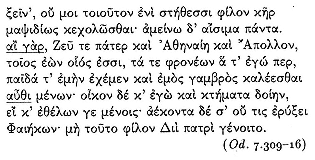
Stranger, I do not have such a mind as to be angry
without a good reason. It is better when things are as they should
be.
If only , O Father Zeus, Athena, and Apollo,
being such a man as you [sc. Odysseus] are, of one mind with me,
[40] Ardizzoni and Campbell ad 1.828 observed the allusion to Od. 6.238ff. A. W. Bulloch brought the relevance of Od. 7.309ff. to my attention.
[41] you might take my daughter and be called my son-in-law,
living here . I would give you a house and property,
if you would stay here. But no one of the Phæacians will keep
you here
against your will. May such behavior not be pleasing to Zeus.
The similarity of the offers in language and context invites us to see Hypsipyle as something of a Nausicaa, an innocent princess whose hand in marriage will bring with it the island kingdom of Lemnos but also take away the eagerly desired

Hypsipyle concludes her speech by bidding Jason to go to his ship and bring back his comrades:

But go now to your ship and tell your comrades
of our offer, and do not remain outside the city.
Circe similarly invited Odysseus to bring his men to her house:
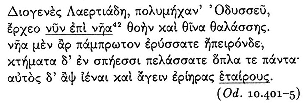
Zeus-born son of Laërtes, devious Odysseus,
go now to your swift ship and to the seashore.
First of all, drag your ship to the shore;
then set all your possessions and ship cables within the caves.
You yourself then return and bring back your trusty companions .
Thus in her initial encounter with Jason, Hypsipyle attempts to do what the wily Calypso, the innocent Nausicaa, and the sorceress Circe all tried and failed to do with Odysseus: to keep Jason on her island, an eventuality that would also have kept him from fulfilling his mission. Jason, however, fully aware of what her invitation
[42]entails, politely refuses:

Hypsipyle's seductive invitation thus fails to divert Jason from his







Reference to the Circe episode continues. Upon returning to the ship Jason reported Hypsipyle's invitation to the men (847). Some time thereafter, the women came to the shore with gifts and escorted the men to their homes. This, as we learn, was encouraged by Aphrodite, who, as a favor to her husband, Hephæstus, took advantage of the Argonautic sojourn to repopulate the island with men (850–52). But not all the Argonauts went up to the city; Heracles and a few comrades remained behind:

And the others ended up where chance had led each,
except for Heracles. For he had been left behind at the ship
of his own accord, together with a few chosen comrades.
This minor detail also pertains to the Odyssean sojourn on Ææa. Thoroughly terrified by his previous encounter with Circe, Eurylochus criticized what he thought was Odysseus's reckless behavior in his desire to return to the cottage (Od. 10.431–37). Odysseus would have killed him were it not for the others who intervened:
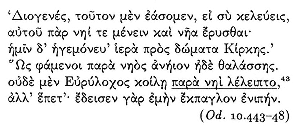
"O Zeus-born, we shall leave him behind, if this is your command,
to remain here alongside the ship and to guard the vessel,
but lead us to the sacred home of Circe."
Thus speaking they left the ship and the sea.
And Eurylochus had not been left behind along the ship ,
but followed us, for he feared my terrible reprimand.
Like Eurylochus, Heracles wants nothing to do with the female inhabitants of the island, and he will voice his hostility toward their stay at the assembly he calls. On the other hand, unlike Eurylochus, Heracles does not fear Jason and chooses to stay on the beach.
At the center of the second half stands the assembly of the Argonauts, which begins with another reference to the Circe episode. When day after day passes and the Argonauts still do not leave the island, Heracles finally calls together the group and reminds them of their mission:

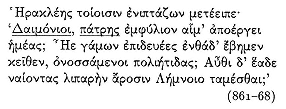
Day after day they kept putting off their
journey, and they would have stayed there inactive for a long time
unless Heracles had assembled the comrades apart from
the women and upbraided them in these words:
"Fools ! Does the shedding of native blood restrict us
from our fatherland? Have we come from there in need of
marriages, because we despise the women of our cities? Have we
decided
to live here and to plow the fertile land of Lemnos?"
Similarly, after a year on Circe's island the men assembled and reminded Odysseus of their goal, their

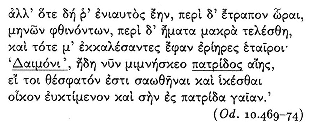
But when a year had passed and the seasons had made their circuit
as the months receded and the long days were completed,
it was then that my faithful comrades summoned me and said:
"Fool , now is the time to remember your native land,
if indeed it is fated for you to be saved and to reach
your well-made home and the land of your fathers."
Jason, then, is no different from his Homeric model in temporarily forgetting his mission; the delay on Lemnos does not per se mark Jason off as nonheroic. Heracles' speech, however, goes on to underscore the essential difference between Jason and himself with regard to their attitude toward heroic action. Heracles, ironically recalling the words of Polyxo (870–71 » 685–87), asserts that one does not earn


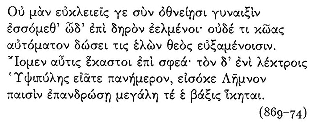
Certainly we shall not become famous by cooping ourselves up
here for a long time with foreign women. The fleece does not move
on its own, and a god will not seize it and hand it over to us if
we say
a prayer. Let us go back to our own homes; let him stay in bed
all day with Hypsipyle until he repopulates Lemnos
with male children and great renown comes his way.
Yet Heracles is absolutely wrong in this assertion; for Jason, making foreign women fall in love with him is one of his special skills through which the mission will ultimately succeed. In Heracles' view, the hero is a man of bold physical action. Jason, however, will complete his mission and thereby attain




Apollonius not only reveals Heracles' attitude toward heroic action; he also subtly calls into question the hero's credibility by casting him in a role that, although sharply contrasting with it, nonetheless provocatively recalls that of the cowardly Eurylochus. Significantly, part of Heracles' speech recalls another Homeric coward, Thersites. At the beginning of his speech, Heracles asked if the Argonauts left Greece because there were no suitable women:

("Did we come here from home in need of

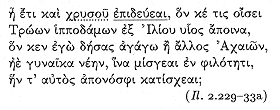
Do you still need

Trojans will bring you from Ilion as a ransom for his son,
someone whom I, or another of the Achæans, have bound and
led away?
Or perhaps a new woman so that you might lie with her,
someone whom you will keep apart for yourself?
At the end of his speech, Heracles tells the others to let Jason spend all day in bed with Hypsipyle while they go home (872–74, quoted above). In addition to envisaging Agamemnon in bed with Briseïs, Thersites likewise goes on to suggest that they go home, leaving Agamemnon to enjoy his prizes:

Cowards, objects of base reproach, Achæan women, no longer
men,
let's sail home in our ships and abandon this one [ sc. Agamemnon]
here in Troy to enjoy his prize, so that he might know
whether we shall be of any help to him or not.
The image of a Heracles who talks like a hero, but in words that recall Homeric cowards, creates a striking dissonance. His decision to remain at the shore with the ship and his reminder to continue the mission have led some to think of Heracles as a kind of
[44] Cf. Mooney ad 1.873, Vian 91 n. 2, Campbell ad 1.872ff.
Stoic saint.[45] On the contrary, Heracles' words and actions, when seen through the Homeric subtexts, lose their edge. Moreover, the shallowness of his heroic bluster becomes clear when, soon after they leave Lemnos, Heracles is completely undone at the loss of his boyfriend, Hylas; he will discover just how powerful love, or rather passion, can be. Jason, on the other hand, never loses control in love; in fact, he never loses lovers, but only discards—or tries to discard—them.[46]
The reminiscence of the assembly of the Greeks at Troy in Iliad 2 continues as the poet tells of the Argonauts' departure from Myrine. When the Lemnian women hear the news that the men are leaving, they rush out of the town in tears to greet the Argonauts for the last time. Apollonius compares them to bees pouring out of a hive gathering "fruit" from flowers:
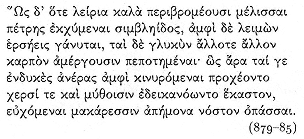
When bees engage in noisy flight around beautiful lilies
after pouring out of their nest among the rocks, and the dewy
glen all about appears happy, they fly to one flower and then to
another
gathering their sweet fruit. Just like this the women
ardently rushed out among the men in tears,
bidding each farewell in words and gestures,
and praying to the blessed gods to grant them a safe return.
The action of the women prompted by the departure of the Argonauts corresponds to that in the scene of their arrival, when the women rushed out fearing an invasion (in particular, cf.

[45] See A. Ardizzoni, L'Eracle "semnós" nel poema di Apollonio (Catania 1937), and Vian 259 ad 856; cf. G. Karl Galinsky, The Herakles Theme (Oxford 1972) 113.
[46] On the contrast between Jason's and Heracles' attitudes toward love in this episode, see C. R. Beye, "Jason as Love-Hero" (supra n. 28) 31–55.
635 » 883). The second rush is quite different. Earlier they were armed for battle and tried to ward off the Argonauts; here, more like devoted wives than threatening warriors, they bid them a tearful goodbye and pray for a safe

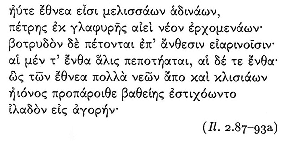
Just as the various hives of bees go forth in great number
from a hollow rock in continual motion
and fly in a swarm upon the vernal flowers,
going here and there in their flight;
so too the many nationalities of men, leaving their ships and tents,
fell into ranks along the wide beach,
entering the assembly by company.
Ancient critics were divided over the success of the Argonautic simile. The scholiast ad 1.879–83d believed that the simile failed because the joy of the image did not match the gloom of the occasion. On the other hand, the comment preserved ad 1.879–83e defended the simile, arguing that the point is "beauty alone and ecphrasis." No scholar, however, (ancient or modern) has observed that the comparison presupposes apicultural theory in vogue in the ancient world, in particular the belief that bees collected their young from the flowers upon which they lighted.[48] In
[47] On the allusion, see Mooney ad 1.879, Ardizzoni ad 880, Vian 91 n. 3, Campbell ad 1.879ff. In addition to the points of contact seen thus far between the two assemblies on Lemnos, I would add that Apollonius informed both with Homeric models, and that both models come from assemblies found in the same books of their respective epics: Od. 2 »Il. 2.
[48] Cf. Aristotle, HA 2.51, GA 3.10; Vergil G. 4.200–202; Columella 9.2.4. See Olck, "Biene," RE 3.1.434. I would now point out that W. Kofler, "Bienen Männer und Lemnos: Beobachtungen zu einem epischen Gleichnis beiApollonius Rhodius (Arg. 1.878–885)," Hermes 120 (1992) 310–19, has recently addressed this issue. It is nice to see that the following interpretation, first made in my 1983 doctoral dissertation, has received independent support from Kofler's more detailed argument.
the first assembly, Polyxo advised the Lemnian women to take advantage of the presence of the Argonauts to reestablish their society and to provide for future generations. Aphrodite aided this plan as a favor to her husband, since the Lemnian men had helped him when he was in need. In fact, Heracles calls attention to the plight of the Lemnian women in his accusation that Jason was trying to repopulate the male segment of Lemnos singlehandedly. Thus, the simile can be seen as hinting at a central issue of the Lemnian encounter, the acquiring of children—an issue with which the episode will conclude. Inasmuch as bees were thought to gather their offspring from flowers, the simile intimates the success that the Lemnian women have had in their plan; like the bees, they have found a source for rejuvenating their population.
As the Lemnian women bid the Argonauts farewell, Apollonius reports the final words exchanged by Jason and Hypsipyle as a counterbalance to their first conversation. Hypsipyle speaks first (888–98). She prays for the successful completion of their mission and reiterates her offer of the kingship of her island. Realizing that Jason will probably never return, she begs to be remembered and asks for instructions about children, if she should become pregnant. In his reply (900–909), Jason accepts her prayer and again refuses the kingship on the ground of his


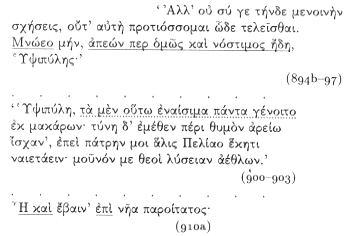
"But you will have no desire
to do this; I can see that this will not turn out so.
Remember , then, both while you are away from home and when
you return ,
Hypsipyle."
. . . . . . . . . .
"Hypsipyle,

through the will of the gods! But have a better opinion
regarding me, since it is enough for me to live in my fatherland
by the good graces of Pelias. May the gods only free me from
my labors!"
. . . . . . . . . .
He spoke , and was the first to get aboard the ship.
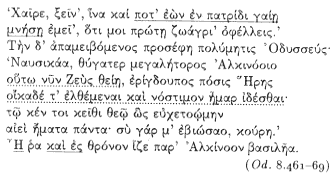
"Farewell, stranger. When you are once again in your native land,
remember me, since you owe me first and foremost for saving your
life."
In response, wily Odysseus said to her:
"Nausicaa, daughter of great-souled Alcinous,


At that time I would pray to you as a god
forever; for you, young woman, have restored my life."
Thus he spoke , and sat upon the couch alongside King Alcinous.
As the episode comes to a close, the reader is left with the image of a Nausicaa-like Hypsipyle; as beautiful and innocent as she may seem, her invitation, like that of her model, nonetheless threatens the hero's


I would like to return briefly to a point that I suggested above; namely, that the Argonauts risked their masculinity in their contact with the women of Lemnos. In the first half, Apollonius concentrates on the Lemnian women, who take on male roles both at the textual and subtextual levels. In the second half, where the structural focus is on the Argonautic assembly, one discerns hints that the Argonauts might be acting in a less than manly fashion. Not only did the women assume a more aggressive role in establishing relationships with the Argonauts, but there is allusion to several passages that suggest that contact with the Lemnian women has threatened to unman those Argonauts who left the shore.
First, in having Jason bring a charm and weapon on his first visit with Hypsipyle—which, as I have shown, in several details recalls Odysseus's encounter with Circe—Apollonius would seem to suggest that the former risks becoming


response to Heracles' rebuke. Like Jason as he entered the city of Myrine (cf. 784), they too keep their eyes on the ground as they leave the assembly in silence:

Thus he rebuked the group, and not anyone dared
to lift up his eyes toward him , nor to say a word .
This description recalls the condition of Anticleia, Odysseus's mother, when the hero met her in the underworld:[50]

And she [sc. Anticleia] sits in silence near the blood and does
not dare
to look up at her son , nor to say a word .
Recalling that Heracles had just told the men that they would not become




In sum, like Odysseus, Jason choses



wherein he differs from his Homeric model. His request that Hypsipyle give up her son to take care of his own parents anticipates his future request of Medea that she too give up her sons.[52] In this request, Jason reveals the selfish side of his personality so unforgettably portrayed by Euripides in the Medea . The Argonautic hero may look and act like an Odysseus when confronted by the feminine threat to his mission, but, as in his departure from home, comparison with his Homeric model underscores the great difference: Odysseus gave up Circe, Calypso, and Nausicaa and the immortality or life of ease they offered so that he could return to his wife and child. Years later Jason will be willing to give up his wife and children and accept the offer of a foreign king to marry his daughter to provide himself with a life of security. Upon comparison with his Homeric models, we may find Heracles' heroic rhetoric empty, especially when we see how he behaves in Mysia; at least he comes across as honest. Jason, on the other hand, proves both here in his concluding speech to Hypsipyle and later in his marriage with Medea (outside the limits of the poem) to be far less committed to the preservation of a family than Odysseus, his primary model in this episode. Such an unhappy contrast between Jason and his Homeric model recalls the unfavorable comparison with Hector in his departure from home.
The encounter with the masculine and aggressive women of Lemnos has indeed threatened to unman the crew of the Argo and thus prevent the expedition from continuing. The Argonauts in the company of the Lemnian women temporarily lost sight of their goal until Heracles got them back on course by appealing to the


[52] This, I argued in Chapter 5, was the point behind the wrath of Thetis, which provided the Argonauts with the "Aulis" suited to their leader. For specific points of comparison between Jason's encounters with Hypsipyle and Medea, see Hunter ad 3.956–61, 975, 1008. To these I would add that the association of Hypsipyle with Circe, Medea's aunt, in the Lemnian episode, is yet another link between the two women.
his own violent "heroism." While it took Heracles, the more traditional type of hero, to remind the Argonauts of their goal, it is the longing to complete their









